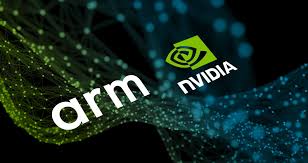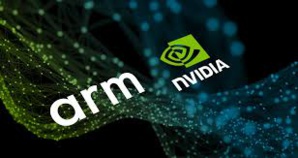There is likely to be strong opposition from the rivals of Nvidia in the chip industry to the $40 billion acquisition of Arm Ltd from SoftBank Group Corp by Nvidia Corp, said analysts.
According to reports, within hours of the deal's announcement, there were voices of opposition to the deal emerging from South Korea and China.
The reach of Arm as a supplier of designs and intellectual property for the semiconductor industry of the world is virtually unparalleled. The company has licensed its technology to the chip makers including Intel Corp, Qualcomm Inc and Samsung Electronics Co Ltd., who are all competitors of Nvidia.
Arm follows a policy of open licensing and provides its technology to all companies that approaches it which has resulted in creation of huge ecosystem of devices - from smart phones to smart toasters, because of the more than 160 billion chips sold based on its technology.
But with a battle between the United States and China and as Beijing is pushing ahead with its strategy of development of a domestic semiconductor industry and with the US seeking to curb that rise, the deal which will squarely put Arm under the direct and complete control of the US-based Nvidia is most likely to be opposed vehemently.
The deal "will rightly face huge opposition" from Arm's customers, said Geoff Blaber, vice president of research for the Americas with CCS Insights.
"An acquisition by Nvidia would be detrimental to Arm and its ecosystem," Blaber said. "Independence is critical to the ongoing success of Arm and once that is compromised, its value will start to erode."
The United Kingdom headquarters of Arm will be retained after the deal which will make it exempt from many U.S. export control laws while the open licensing model of the firm will also be retained, Nvidia Chief Executive Jensen Huang and Arm Chief Executive Simon Segars told Reuters in an interview.
By licensing some of he designs of Nvidia's – which will include its graphical processing unit, or GPU, technology – via the network of silicon partners of Arm, the open licensing model of Arm will be further expanded by Nvidia, Huang also said. Theoretically such a policy will allow other companies that use Arm’s licensed technology to compete with Nvidia.
Linley Gwennap, principal analyst at The Linley Group, said: Nvidia "took great pains to emphasize that Arm will continue to act as a neutral supplier, and it must not interfere with any of Arm's licensing efforts, even if some Arm customers compete with Nvidia."
But within hours after the deal was announced, there was immediate skepticism of the deal.
"China is going to hate it," said one Chinese chip executive who also noted that if Arm had an American parent company, it would be harder for those American companies working with Arm to create server chips to sell their products in China.
In the arenas of self-driving cars and other future technologies, the competition between Nvidia with Samsung, Qualcomm and others would get intensified with the acquisition of Arm by Nvidia, said an official of the South Korean chip industry. There would also be concerns about arm increasing its fees for licensing to Nvidia’s competitors.
"Arm customers may try to find alternatives to Arm for the longer term," a chip industry source in Korea said.
(Source:www.economictimes.com)
According to reports, within hours of the deal's announcement, there were voices of opposition to the deal emerging from South Korea and China.
The reach of Arm as a supplier of designs and intellectual property for the semiconductor industry of the world is virtually unparalleled. The company has licensed its technology to the chip makers including Intel Corp, Qualcomm Inc and Samsung Electronics Co Ltd., who are all competitors of Nvidia.
Arm follows a policy of open licensing and provides its technology to all companies that approaches it which has resulted in creation of huge ecosystem of devices - from smart phones to smart toasters, because of the more than 160 billion chips sold based on its technology.
But with a battle between the United States and China and as Beijing is pushing ahead with its strategy of development of a domestic semiconductor industry and with the US seeking to curb that rise, the deal which will squarely put Arm under the direct and complete control of the US-based Nvidia is most likely to be opposed vehemently.
The deal "will rightly face huge opposition" from Arm's customers, said Geoff Blaber, vice president of research for the Americas with CCS Insights.
"An acquisition by Nvidia would be detrimental to Arm and its ecosystem," Blaber said. "Independence is critical to the ongoing success of Arm and once that is compromised, its value will start to erode."
The United Kingdom headquarters of Arm will be retained after the deal which will make it exempt from many U.S. export control laws while the open licensing model of the firm will also be retained, Nvidia Chief Executive Jensen Huang and Arm Chief Executive Simon Segars told Reuters in an interview.
By licensing some of he designs of Nvidia's – which will include its graphical processing unit, or GPU, technology – via the network of silicon partners of Arm, the open licensing model of Arm will be further expanded by Nvidia, Huang also said. Theoretically such a policy will allow other companies that use Arm’s licensed technology to compete with Nvidia.
Linley Gwennap, principal analyst at The Linley Group, said: Nvidia "took great pains to emphasize that Arm will continue to act as a neutral supplier, and it must not interfere with any of Arm's licensing efforts, even if some Arm customers compete with Nvidia."
But within hours after the deal was announced, there was immediate skepticism of the deal.
"China is going to hate it," said one Chinese chip executive who also noted that if Arm had an American parent company, it would be harder for those American companies working with Arm to create server chips to sell their products in China.
In the arenas of self-driving cars and other future technologies, the competition between Nvidia with Samsung, Qualcomm and others would get intensified with the acquisition of Arm by Nvidia, said an official of the South Korean chip industry. There would also be concerns about arm increasing its fees for licensing to Nvidia’s competitors.
"Arm customers may try to find alternatives to Arm for the longer term," a chip industry source in Korea said.
(Source:www.economictimes.com)






